Evaluating Capital Allocation in UK Economy & International Finance
VerifiedAdded on 2023/06/17
|12
|3638
|429
Report
AI Summary
This report provides an overview of international trade finance and investment, emphasizing its significance in the global market. It explores the role of financial markets in allocating capital within domestic and international economies, with a specific focus on the United Kingdom. The report details the evolution of financial markets, from the barter system to modern stock markets, and explains how capital allocation occurs through financial institutions that channel funds from savers to borrowers. It discusses the regulatory frameworks, including the Financial Conduct Authority (FCA), that ensure market efficiency and consumer protection in the UK. Furthermore, the report examines international capital allocation through mechanisms like foreign direct investment, international lending, and the role of global organizations such as the World Bank and IMF. An evaluation of the UK economy highlights its strengths and challenges, including the impact of Brexit on trade and economic growth. The report concludes with a critical assessment of the challenges faced by the UK due to industrialization and trade policies, providing a comprehensive understanding of the financial dynamics influencing international trade and investment.
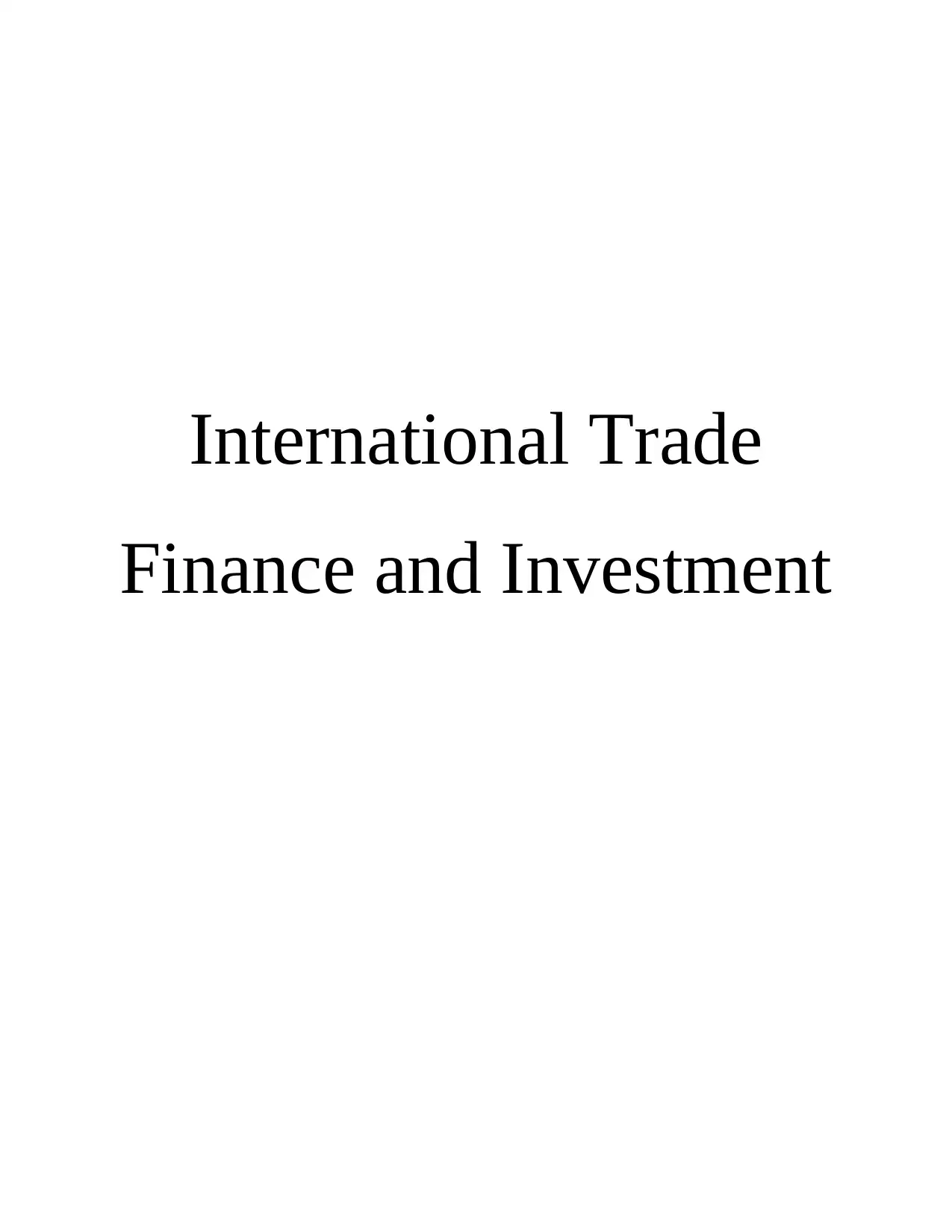
International Trade
Finance and Investment
Finance and Investment
Paraphrase This Document
Need a fresh take? Get an instant paraphrase of this document with our AI Paraphraser
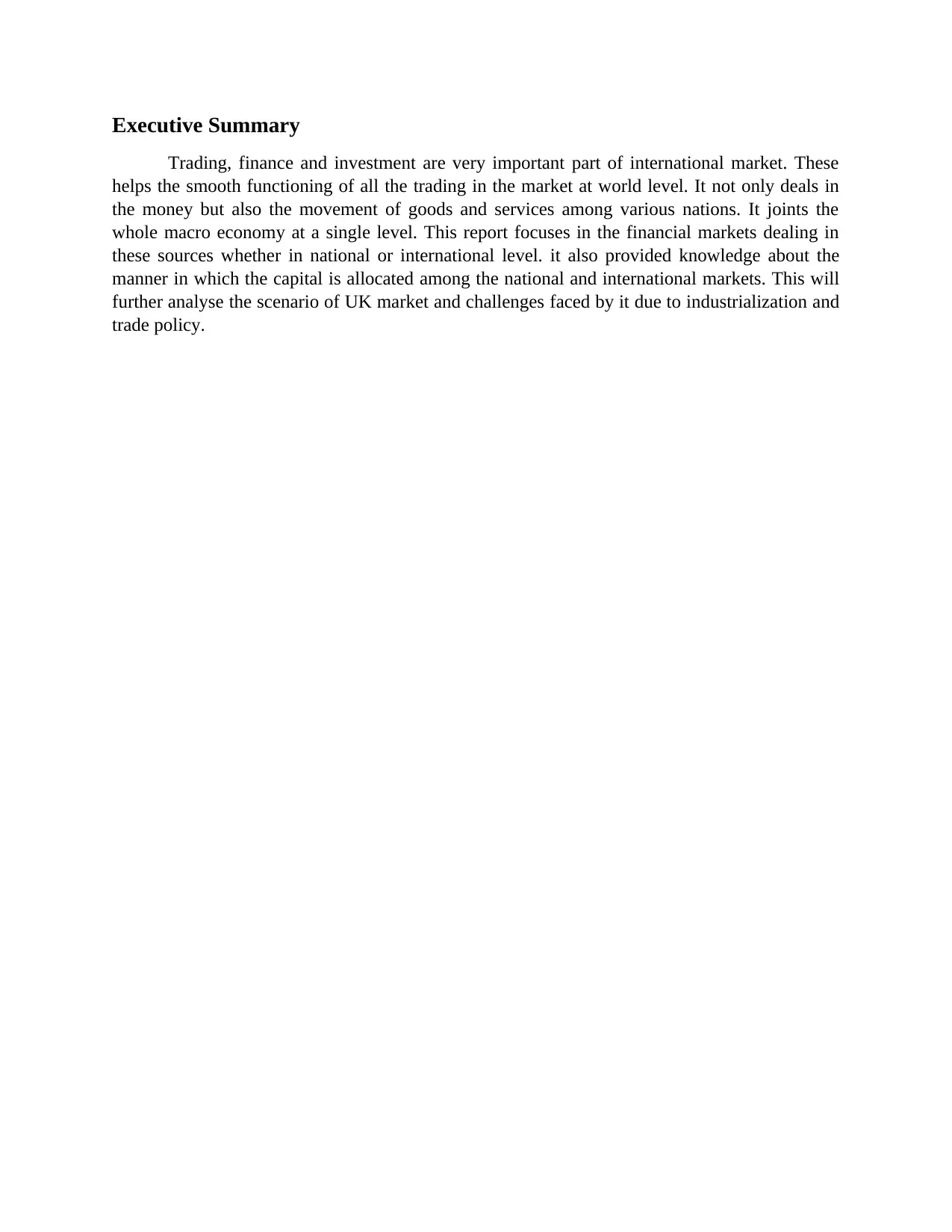
Executive Summary
Trading, finance and investment are very important part of international market. These
helps the smooth functioning of all the trading in the market at world level. It not only deals in
the money but also the movement of goods and services among various nations. It joints the
whole macro economy at a single level. This report focuses in the financial markets dealing in
these sources whether in national or international level. it also provided knowledge about the
manner in which the capital is allocated among the national and international markets. This will
further analyse the scenario of UK market and challenges faced by it due to industrialization and
trade policy.
Trading, finance and investment are very important part of international market. These
helps the smooth functioning of all the trading in the market at world level. It not only deals in
the money but also the movement of goods and services among various nations. It joints the
whole macro economy at a single level. This report focuses in the financial markets dealing in
these sources whether in national or international level. it also provided knowledge about the
manner in which the capital is allocated among the national and international markets. This will
further analyse the scenario of UK market and challenges faced by it due to industrialization and
trade policy.
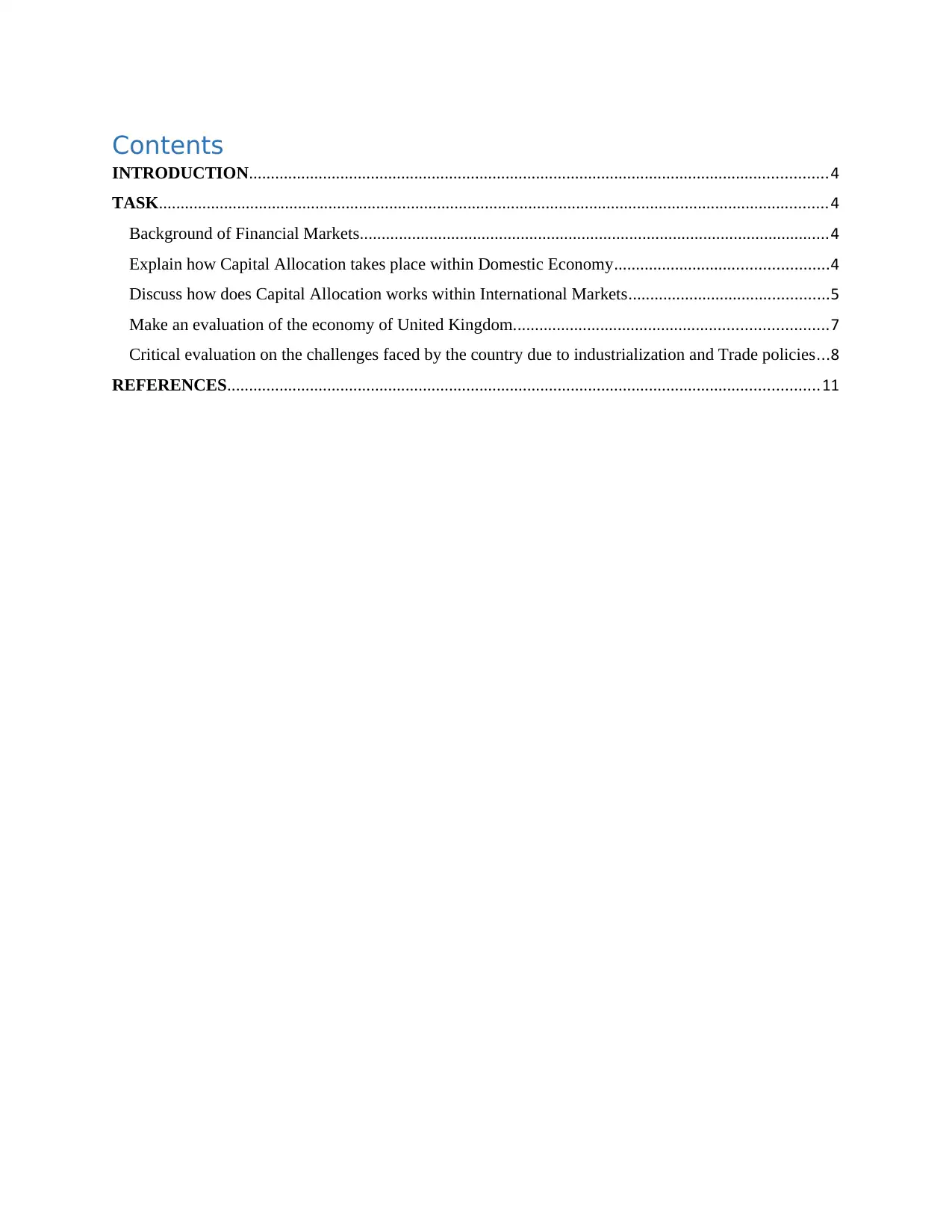
Contents
INTRODUCTION.....................................................................................................................................4
TASK..........................................................................................................................................................4
Background of Financial Markets............................................................................................................4
Explain how Capital Allocation takes place within Domestic Economy.................................................4
Discuss how does Capital Allocation works within International Markets..............................................5
Make an evaluation of the economy of United Kingdom........................................................................7
Critical evaluation on the challenges faced by the country due to industrialization and Trade policies...8
REFERENCES........................................................................................................................................11
INTRODUCTION.....................................................................................................................................4
TASK..........................................................................................................................................................4
Background of Financial Markets............................................................................................................4
Explain how Capital Allocation takes place within Domestic Economy.................................................4
Discuss how does Capital Allocation works within International Markets..............................................5
Make an evaluation of the economy of United Kingdom........................................................................7
Critical evaluation on the challenges faced by the country due to industrialization and Trade policies...8
REFERENCES........................................................................................................................................11
⊘ This is a preview!⊘
Do you want full access?
Subscribe today to unlock all pages.

Trusted by 1+ million students worldwide
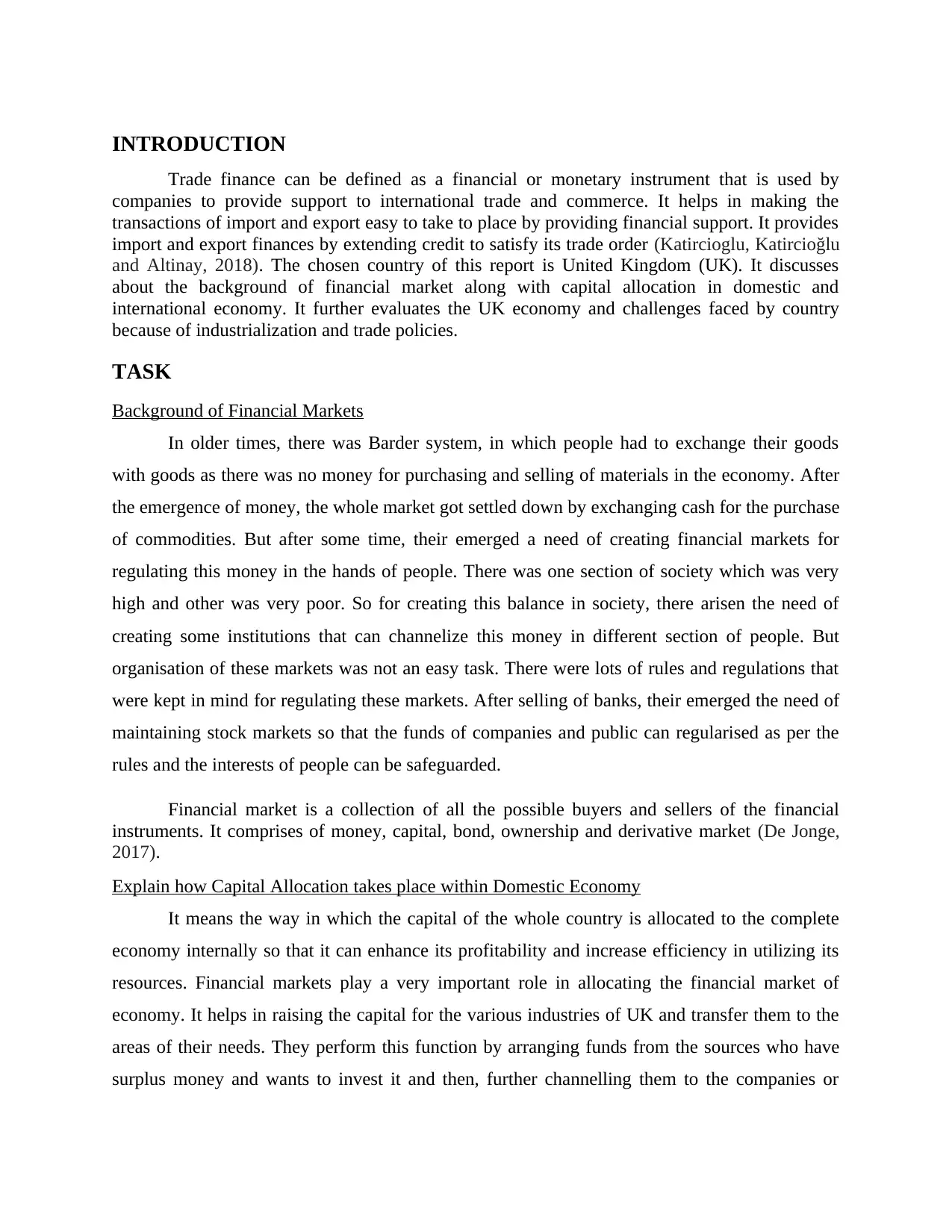
INTRODUCTION
Trade finance can be defined as a financial or monetary instrument that is used by
companies to provide support to international trade and commerce. It helps in making the
transactions of import and export easy to take to place by providing financial support. It provides
import and export finances by extending credit to satisfy its trade order (Katircioglu, Katircioğlu
and Altinay, 2018). The chosen country of this report is United Kingdom (UK). It discusses
about the background of financial market along with capital allocation in domestic and
international economy. It further evaluates the UK economy and challenges faced by country
because of industrialization and trade policies.
TASK
Background of Financial Markets
In older times, there was Barder system, in which people had to exchange their goods
with goods as there was no money for purchasing and selling of materials in the economy. After
the emergence of money, the whole market got settled down by exchanging cash for the purchase
of commodities. But after some time, their emerged a need of creating financial markets for
regulating this money in the hands of people. There was one section of society which was very
high and other was very poor. So for creating this balance in society, there arisen the need of
creating some institutions that can channelize this money in different section of people. But
organisation of these markets was not an easy task. There were lots of rules and regulations that
were kept in mind for regulating these markets. After selling of banks, their emerged the need of
maintaining stock markets so that the funds of companies and public can regularised as per the
rules and the interests of people can be safeguarded.
Financial market is a collection of all the possible buyers and sellers of the financial
instruments. It comprises of money, capital, bond, ownership and derivative market (De Jonge,
2017).
Explain how Capital Allocation takes place within Domestic Economy
It means the way in which the capital of the whole country is allocated to the complete
economy internally so that it can enhance its profitability and increase efficiency in utilizing its
resources. Financial markets play a very important role in allocating the financial market of
economy. It helps in raising the capital for the various industries of UK and transfer them to the
areas of their needs. They perform this function by arranging funds from the sources who have
surplus money and wants to invest it and then, further channelling them to the companies or
Trade finance can be defined as a financial or monetary instrument that is used by
companies to provide support to international trade and commerce. It helps in making the
transactions of import and export easy to take to place by providing financial support. It provides
import and export finances by extending credit to satisfy its trade order (Katircioglu, Katircioğlu
and Altinay, 2018). The chosen country of this report is United Kingdom (UK). It discusses
about the background of financial market along with capital allocation in domestic and
international economy. It further evaluates the UK economy and challenges faced by country
because of industrialization and trade policies.
TASK
Background of Financial Markets
In older times, there was Barder system, in which people had to exchange their goods
with goods as there was no money for purchasing and selling of materials in the economy. After
the emergence of money, the whole market got settled down by exchanging cash for the purchase
of commodities. But after some time, their emerged a need of creating financial markets for
regulating this money in the hands of people. There was one section of society which was very
high and other was very poor. So for creating this balance in society, there arisen the need of
creating some institutions that can channelize this money in different section of people. But
organisation of these markets was not an easy task. There were lots of rules and regulations that
were kept in mind for regulating these markets. After selling of banks, their emerged the need of
maintaining stock markets so that the funds of companies and public can regularised as per the
rules and the interests of people can be safeguarded.
Financial market is a collection of all the possible buyers and sellers of the financial
instruments. It comprises of money, capital, bond, ownership and derivative market (De Jonge,
2017).
Explain how Capital Allocation takes place within Domestic Economy
It means the way in which the capital of the whole country is allocated to the complete
economy internally so that it can enhance its profitability and increase efficiency in utilizing its
resources. Financial markets play a very important role in allocating the financial market of
economy. It helps in raising the capital for the various industries of UK and transfer them to the
areas of their needs. They perform this function by arranging funds from the sources who have
surplus money and wants to invest it and then, further channelling them to the companies or
Paraphrase This Document
Need a fresh take? Get an instant paraphrase of this document with our AI Paraphraser
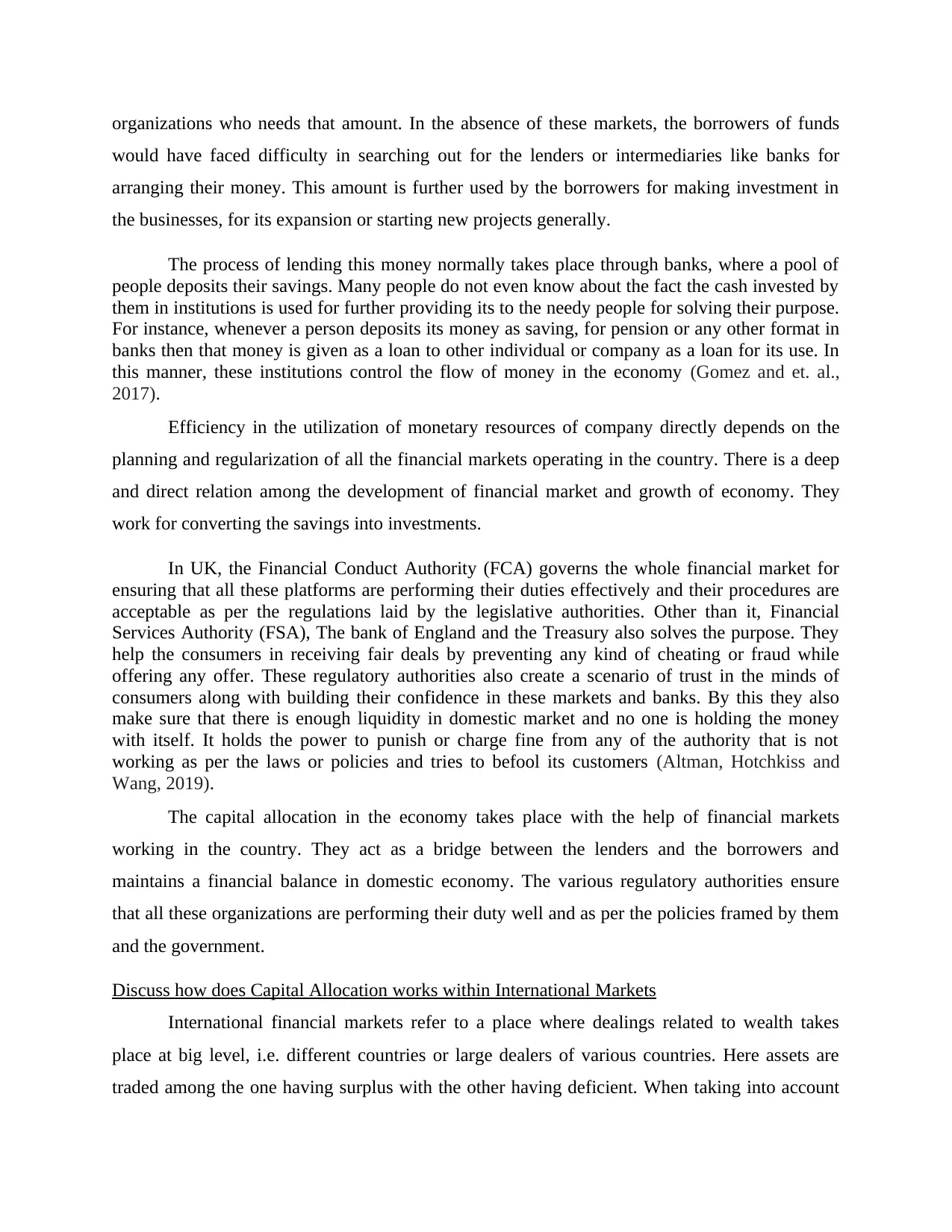
organizations who needs that amount. In the absence of these markets, the borrowers of funds
would have faced difficulty in searching out for the lenders or intermediaries like banks for
arranging their money. This amount is further used by the borrowers for making investment in
the businesses, for its expansion or starting new projects generally.
The process of lending this money normally takes place through banks, where a pool of
people deposits their savings. Many people do not even know about the fact the cash invested by
them in institutions is used for further providing its to the needy people for solving their purpose.
For instance, whenever a person deposits its money as saving, for pension or any other format in
banks then that money is given as a loan to other individual or company as a loan for its use. In
this manner, these institutions control the flow of money in the economy (Gomez and et. al.,
2017).
Efficiency in the utilization of monetary resources of company directly depends on the
planning and regularization of all the financial markets operating in the country. There is a deep
and direct relation among the development of financial market and growth of economy. They
work for converting the savings into investments.
In UK, the Financial Conduct Authority (FCA) governs the whole financial market for
ensuring that all these platforms are performing their duties effectively and their procedures are
acceptable as per the regulations laid by the legislative authorities. Other than it, Financial
Services Authority (FSA), The bank of England and the Treasury also solves the purpose. They
help the consumers in receiving fair deals by preventing any kind of cheating or fraud while
offering any offer. These regulatory authorities also create a scenario of trust in the minds of
consumers along with building their confidence in these markets and banks. By this they also
make sure that there is enough liquidity in domestic market and no one is holding the money
with itself. It holds the power to punish or charge fine from any of the authority that is not
working as per the laws or policies and tries to befool its customers (Altman, Hotchkiss and
Wang, 2019).
The capital allocation in the economy takes place with the help of financial markets
working in the country. They act as a bridge between the lenders and the borrowers and
maintains a financial balance in domestic economy. The various regulatory authorities ensure
that all these organizations are performing their duty well and as per the policies framed by them
and the government.
Discuss how does Capital Allocation works within International Markets
International financial markets refer to a place where dealings related to wealth takes
place at big level, i.e. different countries or large dealers of various countries. Here assets are
traded among the one having surplus with the other having deficient. When taking into account
would have faced difficulty in searching out for the lenders or intermediaries like banks for
arranging their money. This amount is further used by the borrowers for making investment in
the businesses, for its expansion or starting new projects generally.
The process of lending this money normally takes place through banks, where a pool of
people deposits their savings. Many people do not even know about the fact the cash invested by
them in institutions is used for further providing its to the needy people for solving their purpose.
For instance, whenever a person deposits its money as saving, for pension or any other format in
banks then that money is given as a loan to other individual or company as a loan for its use. In
this manner, these institutions control the flow of money in the economy (Gomez and et. al.,
2017).
Efficiency in the utilization of monetary resources of company directly depends on the
planning and regularization of all the financial markets operating in the country. There is a deep
and direct relation among the development of financial market and growth of economy. They
work for converting the savings into investments.
In UK, the Financial Conduct Authority (FCA) governs the whole financial market for
ensuring that all these platforms are performing their duties effectively and their procedures are
acceptable as per the regulations laid by the legislative authorities. Other than it, Financial
Services Authority (FSA), The bank of England and the Treasury also solves the purpose. They
help the consumers in receiving fair deals by preventing any kind of cheating or fraud while
offering any offer. These regulatory authorities also create a scenario of trust in the minds of
consumers along with building their confidence in these markets and banks. By this they also
make sure that there is enough liquidity in domestic market and no one is holding the money
with itself. It holds the power to punish or charge fine from any of the authority that is not
working as per the laws or policies and tries to befool its customers (Altman, Hotchkiss and
Wang, 2019).
The capital allocation in the economy takes place with the help of financial markets
working in the country. They act as a bridge between the lenders and the borrowers and
maintains a financial balance in domestic economy. The various regulatory authorities ensure
that all these organizations are performing their duty well and as per the policies framed by them
and the government.
Discuss how does Capital Allocation works within International Markets
International financial markets refer to a place where dealings related to wealth takes
place at big level, i.e. different countries or large dealers of various countries. Here assets are
traded among the one having surplus with the other having deficient. When taking into account
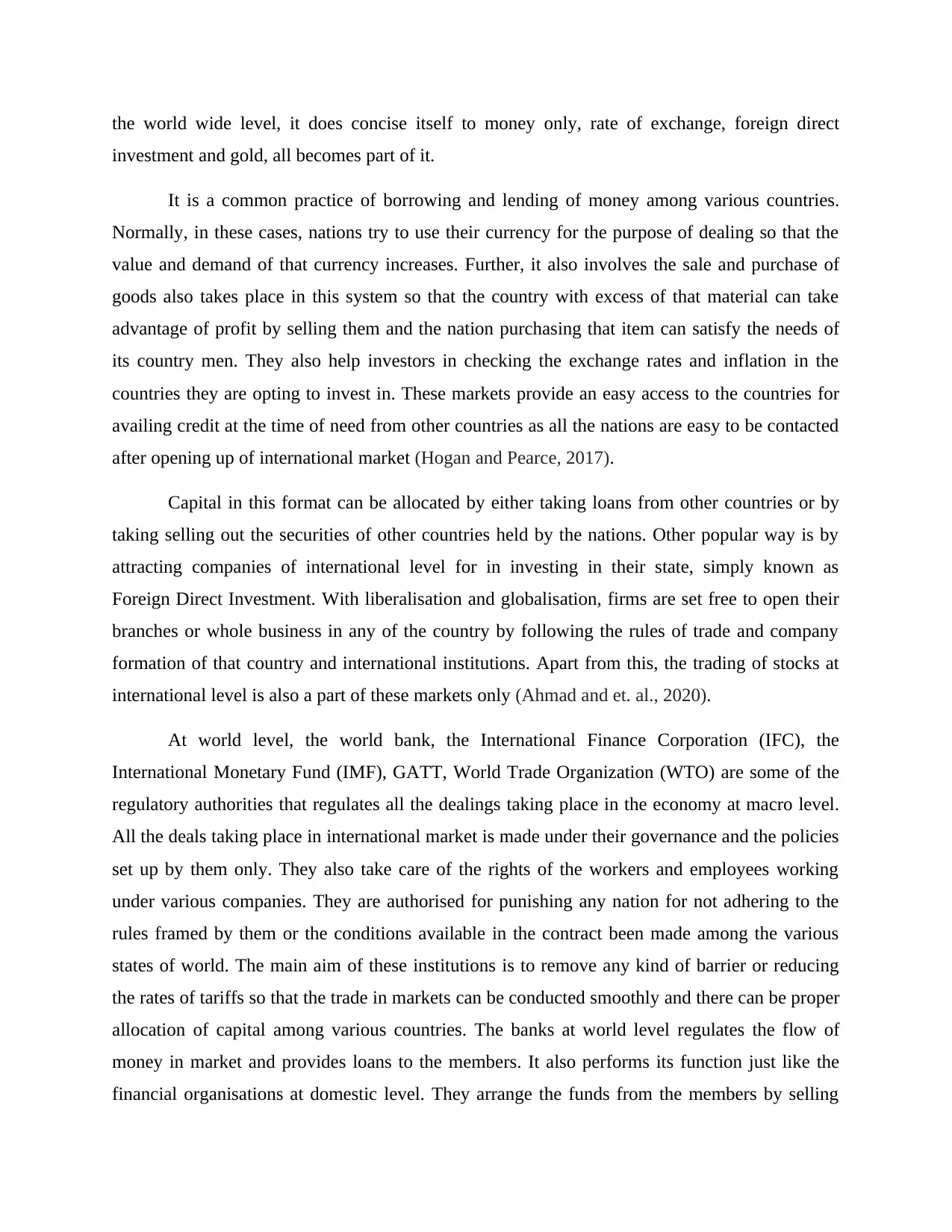
the world wide level, it does concise itself to money only, rate of exchange, foreign direct
investment and gold, all becomes part of it.
It is a common practice of borrowing and lending of money among various countries.
Normally, in these cases, nations try to use their currency for the purpose of dealing so that the
value and demand of that currency increases. Further, it also involves the sale and purchase of
goods also takes place in this system so that the country with excess of that material can take
advantage of profit by selling them and the nation purchasing that item can satisfy the needs of
its country men. They also help investors in checking the exchange rates and inflation in the
countries they are opting to invest in. These markets provide an easy access to the countries for
availing credit at the time of need from other countries as all the nations are easy to be contacted
after opening up of international market (Hogan and Pearce, 2017).
Capital in this format can be allocated by either taking loans from other countries or by
taking selling out the securities of other countries held by the nations. Other popular way is by
attracting companies of international level for in investing in their state, simply known as
Foreign Direct Investment. With liberalisation and globalisation, firms are set free to open their
branches or whole business in any of the country by following the rules of trade and company
formation of that country and international institutions. Apart from this, the trading of stocks at
international level is also a part of these markets only (Ahmad and et. al., 2020).
At world level, the world bank, the International Finance Corporation (IFC), the
International Monetary Fund (IMF), GATT, World Trade Organization (WTO) are some of the
regulatory authorities that regulates all the dealings taking place in the economy at macro level.
All the deals taking place in international market is made under their governance and the policies
set up by them only. They also take care of the rights of the workers and employees working
under various companies. They are authorised for punishing any nation for not adhering to the
rules framed by them or the conditions available in the contract been made among the various
states of world. The main aim of these institutions is to remove any kind of barrier or reducing
the rates of tariffs so that the trade in markets can be conducted smoothly and there can be proper
allocation of capital among various countries. The banks at world level regulates the flow of
money in market and provides loans to the members. It also performs its function just like the
financial organisations at domestic level. They arrange the funds from the members by selling
investment and gold, all becomes part of it.
It is a common practice of borrowing and lending of money among various countries.
Normally, in these cases, nations try to use their currency for the purpose of dealing so that the
value and demand of that currency increases. Further, it also involves the sale and purchase of
goods also takes place in this system so that the country with excess of that material can take
advantage of profit by selling them and the nation purchasing that item can satisfy the needs of
its country men. They also help investors in checking the exchange rates and inflation in the
countries they are opting to invest in. These markets provide an easy access to the countries for
availing credit at the time of need from other countries as all the nations are easy to be contacted
after opening up of international market (Hogan and Pearce, 2017).
Capital in this format can be allocated by either taking loans from other countries or by
taking selling out the securities of other countries held by the nations. Other popular way is by
attracting companies of international level for in investing in their state, simply known as
Foreign Direct Investment. With liberalisation and globalisation, firms are set free to open their
branches or whole business in any of the country by following the rules of trade and company
formation of that country and international institutions. Apart from this, the trading of stocks at
international level is also a part of these markets only (Ahmad and et. al., 2020).
At world level, the world bank, the International Finance Corporation (IFC), the
International Monetary Fund (IMF), GATT, World Trade Organization (WTO) are some of the
regulatory authorities that regulates all the dealings taking place in the economy at macro level.
All the deals taking place in international market is made under their governance and the policies
set up by them only. They also take care of the rights of the workers and employees working
under various companies. They are authorised for punishing any nation for not adhering to the
rules framed by them or the conditions available in the contract been made among the various
states of world. The main aim of these institutions is to remove any kind of barrier or reducing
the rates of tariffs so that the trade in markets can be conducted smoothly and there can be proper
allocation of capital among various countries. The banks at world level regulates the flow of
money in market and provides loans to the members. It also performs its function just like the
financial organisations at domestic level. They arrange the funds from the members by selling
⊘ This is a preview!⊘
Do you want full access?
Subscribe today to unlock all pages.

Trusted by 1+ million students worldwide
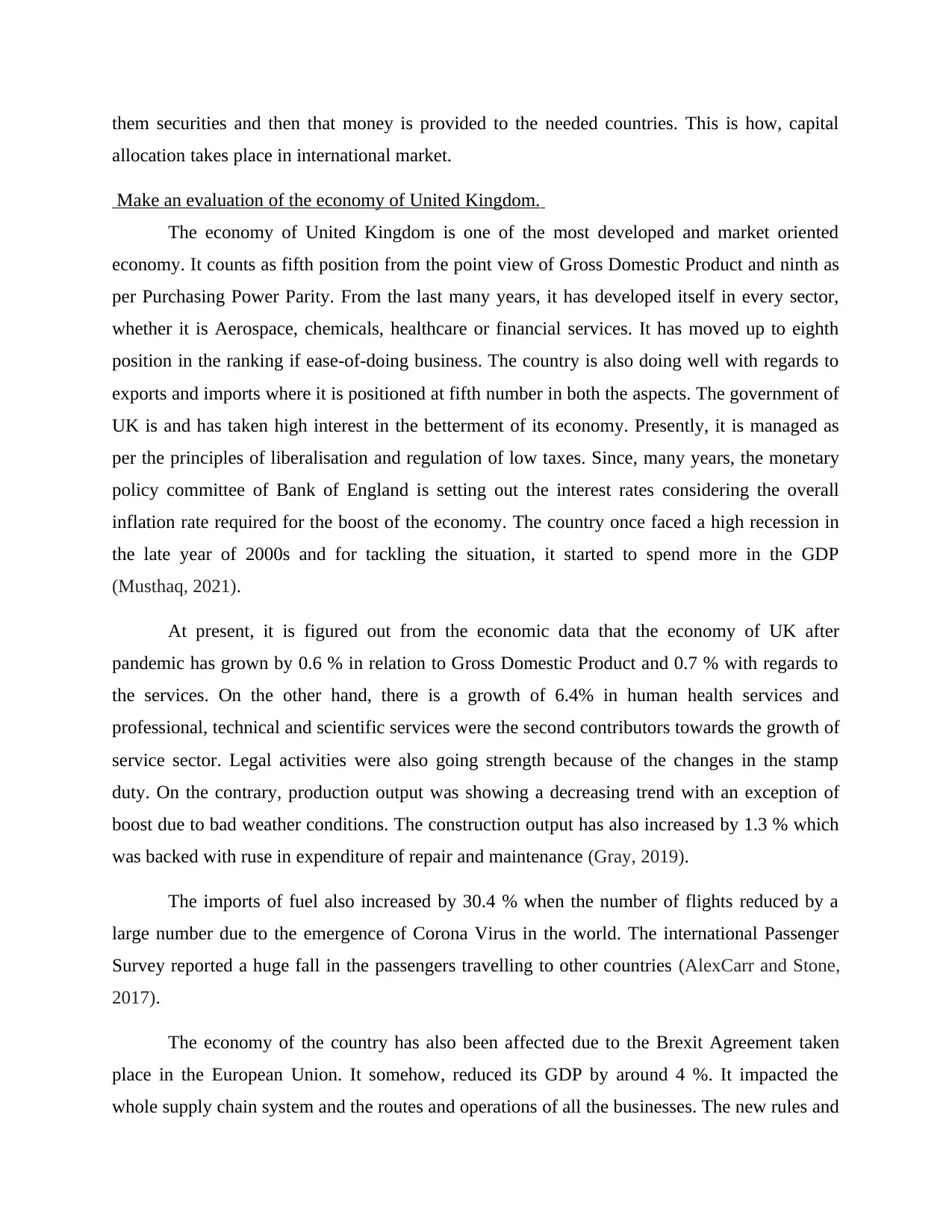
them securities and then that money is provided to the needed countries. This is how, capital
allocation takes place in international market.
Make an evaluation of the economy of United Kingdom.
The economy of United Kingdom is one of the most developed and market oriented
economy. It counts as fifth position from the point view of Gross Domestic Product and ninth as
per Purchasing Power Parity. From the last many years, it has developed itself in every sector,
whether it is Aerospace, chemicals, healthcare or financial services. It has moved up to eighth
position in the ranking if ease-of-doing business. The country is also doing well with regards to
exports and imports where it is positioned at fifth number in both the aspects. The government of
UK is and has taken high interest in the betterment of its economy. Presently, it is managed as
per the principles of liberalisation and regulation of low taxes. Since, many years, the monetary
policy committee of Bank of England is setting out the interest rates considering the overall
inflation rate required for the boost of the economy. The country once faced a high recession in
the late year of 2000s and for tackling the situation, it started to spend more in the GDP
(Musthaq, 2021).
At present, it is figured out from the economic data that the economy of UK after
pandemic has grown by 0.6 % in relation to Gross Domestic Product and 0.7 % with regards to
the services. On the other hand, there is a growth of 6.4% in human health services and
professional, technical and scientific services were the second contributors towards the growth of
service sector. Legal activities were also going strength because of the changes in the stamp
duty. On the contrary, production output was showing a decreasing trend with an exception of
boost due to bad weather conditions. The construction output has also increased by 1.3 % which
was backed with ruse in expenditure of repair and maintenance (Gray, 2019).
The imports of fuel also increased by 30.4 % when the number of flights reduced by a
large number due to the emergence of Corona Virus in the world. The international Passenger
Survey reported a huge fall in the passengers travelling to other countries (AlexCarr and Stone,
2017).
The economy of the country has also been affected due to the Brexit Agreement taken
place in the European Union. It somehow, reduced its GDP by around 4 %. It impacted the
whole supply chain system and the routes and operations of all the businesses. The new rules and
allocation takes place in international market.
Make an evaluation of the economy of United Kingdom.
The economy of United Kingdom is one of the most developed and market oriented
economy. It counts as fifth position from the point view of Gross Domestic Product and ninth as
per Purchasing Power Parity. From the last many years, it has developed itself in every sector,
whether it is Aerospace, chemicals, healthcare or financial services. It has moved up to eighth
position in the ranking if ease-of-doing business. The country is also doing well with regards to
exports and imports where it is positioned at fifth number in both the aspects. The government of
UK is and has taken high interest in the betterment of its economy. Presently, it is managed as
per the principles of liberalisation and regulation of low taxes. Since, many years, the monetary
policy committee of Bank of England is setting out the interest rates considering the overall
inflation rate required for the boost of the economy. The country once faced a high recession in
the late year of 2000s and for tackling the situation, it started to spend more in the GDP
(Musthaq, 2021).
At present, it is figured out from the economic data that the economy of UK after
pandemic has grown by 0.6 % in relation to Gross Domestic Product and 0.7 % with regards to
the services. On the other hand, there is a growth of 6.4% in human health services and
professional, technical and scientific services were the second contributors towards the growth of
service sector. Legal activities were also going strength because of the changes in the stamp
duty. On the contrary, production output was showing a decreasing trend with an exception of
boost due to bad weather conditions. The construction output has also increased by 1.3 % which
was backed with ruse in expenditure of repair and maintenance (Gray, 2019).
The imports of fuel also increased by 30.4 % when the number of flights reduced by a
large number due to the emergence of Corona Virus in the world. The international Passenger
Survey reported a huge fall in the passengers travelling to other countries (AlexCarr and Stone,
2017).
The economy of the country has also been affected due to the Brexit Agreement taken
place in the European Union. It somehow, reduced its GDP by around 4 %. It impacted the
whole supply chain system and the routes and operations of all the businesses. The new rules and
Paraphrase This Document
Need a fresh take? Get an instant paraphrase of this document with our AI Paraphraser
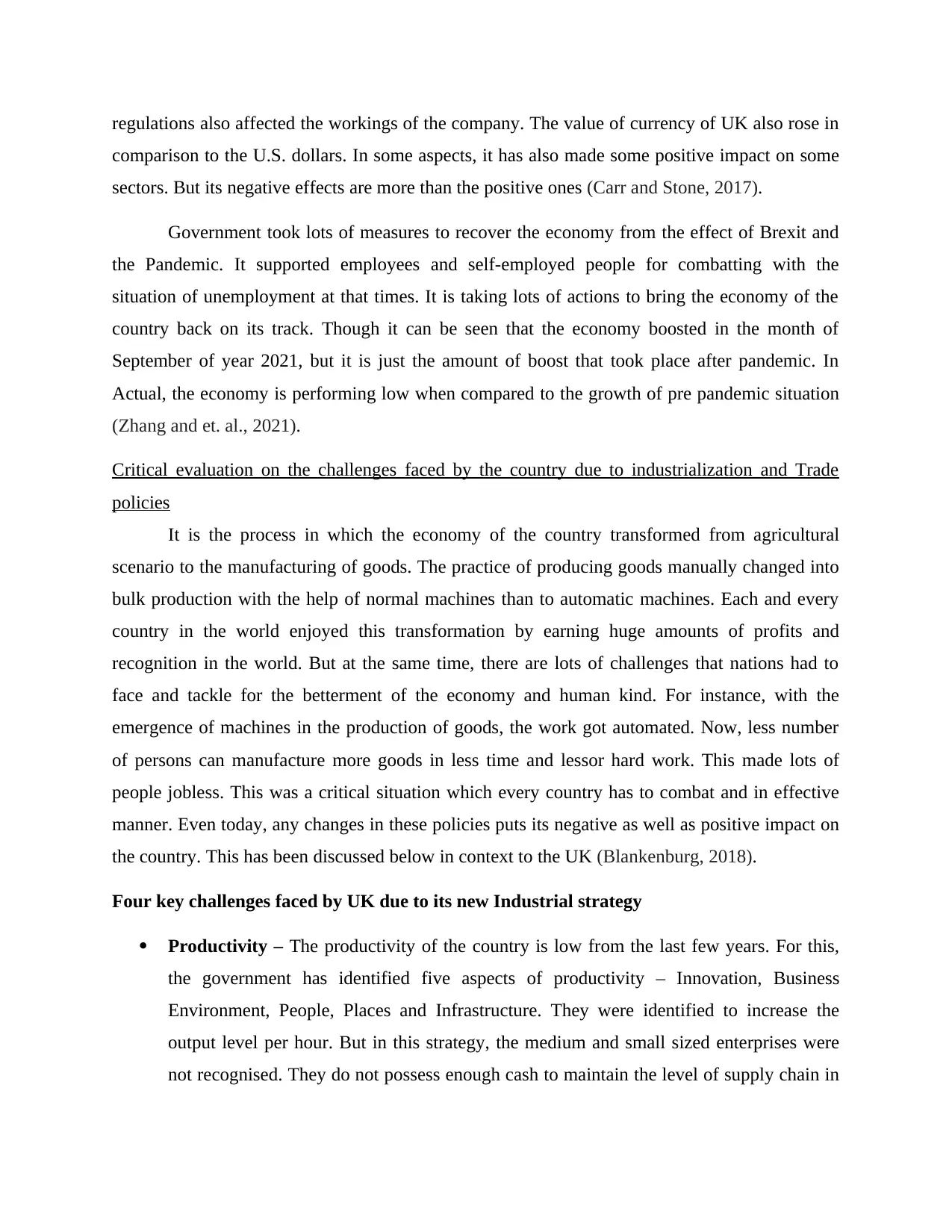
regulations also affected the workings of the company. The value of currency of UK also rose in
comparison to the U.S. dollars. In some aspects, it has also made some positive impact on some
sectors. But its negative effects are more than the positive ones (Carr and Stone, 2017).
Government took lots of measures to recover the economy from the effect of Brexit and
the Pandemic. It supported employees and self-employed people for combatting with the
situation of unemployment at that times. It is taking lots of actions to bring the economy of the
country back on its track. Though it can be seen that the economy boosted in the month of
September of year 2021, but it is just the amount of boost that took place after pandemic. In
Actual, the economy is performing low when compared to the growth of pre pandemic situation
(Zhang and et. al., 2021).
Critical evaluation on the challenges faced by the country due to industrialization and Trade
policies
It is the process in which the economy of the country transformed from agricultural
scenario to the manufacturing of goods. The practice of producing goods manually changed into
bulk production with the help of normal machines than to automatic machines. Each and every
country in the world enjoyed this transformation by earning huge amounts of profits and
recognition in the world. But at the same time, there are lots of challenges that nations had to
face and tackle for the betterment of the economy and human kind. For instance, with the
emergence of machines in the production of goods, the work got automated. Now, less number
of persons can manufacture more goods in less time and lessor hard work. This made lots of
people jobless. This was a critical situation which every country has to combat and in effective
manner. Even today, any changes in these policies puts its negative as well as positive impact on
the country. This has been discussed below in context to the UK (Blankenburg, 2018).
Four key challenges faced by UK due to its new Industrial strategy
Productivity – The productivity of the country is low from the last few years. For this,
the government has identified five aspects of productivity – Innovation, Business
Environment, People, Places and Infrastructure. They were identified to increase the
output level per hour. But in this strategy, the medium and small sized enterprises were
not recognised. They do not possess enough cash to maintain the level of supply chain in
comparison to the U.S. dollars. In some aspects, it has also made some positive impact on some
sectors. But its negative effects are more than the positive ones (Carr and Stone, 2017).
Government took lots of measures to recover the economy from the effect of Brexit and
the Pandemic. It supported employees and self-employed people for combatting with the
situation of unemployment at that times. It is taking lots of actions to bring the economy of the
country back on its track. Though it can be seen that the economy boosted in the month of
September of year 2021, but it is just the amount of boost that took place after pandemic. In
Actual, the economy is performing low when compared to the growth of pre pandemic situation
(Zhang and et. al., 2021).
Critical evaluation on the challenges faced by the country due to industrialization and Trade
policies
It is the process in which the economy of the country transformed from agricultural
scenario to the manufacturing of goods. The practice of producing goods manually changed into
bulk production with the help of normal machines than to automatic machines. Each and every
country in the world enjoyed this transformation by earning huge amounts of profits and
recognition in the world. But at the same time, there are lots of challenges that nations had to
face and tackle for the betterment of the economy and human kind. For instance, with the
emergence of machines in the production of goods, the work got automated. Now, less number
of persons can manufacture more goods in less time and lessor hard work. This made lots of
people jobless. This was a critical situation which every country has to combat and in effective
manner. Even today, any changes in these policies puts its negative as well as positive impact on
the country. This has been discussed below in context to the UK (Blankenburg, 2018).
Four key challenges faced by UK due to its new Industrial strategy
Productivity – The productivity of the country is low from the last few years. For this,
the government has identified five aspects of productivity – Innovation, Business
Environment, People, Places and Infrastructure. They were identified to increase the
output level per hour. But in this strategy, the medium and small sized enterprises were
not recognised. They do not possess enough cash to maintain the level of supply chain in
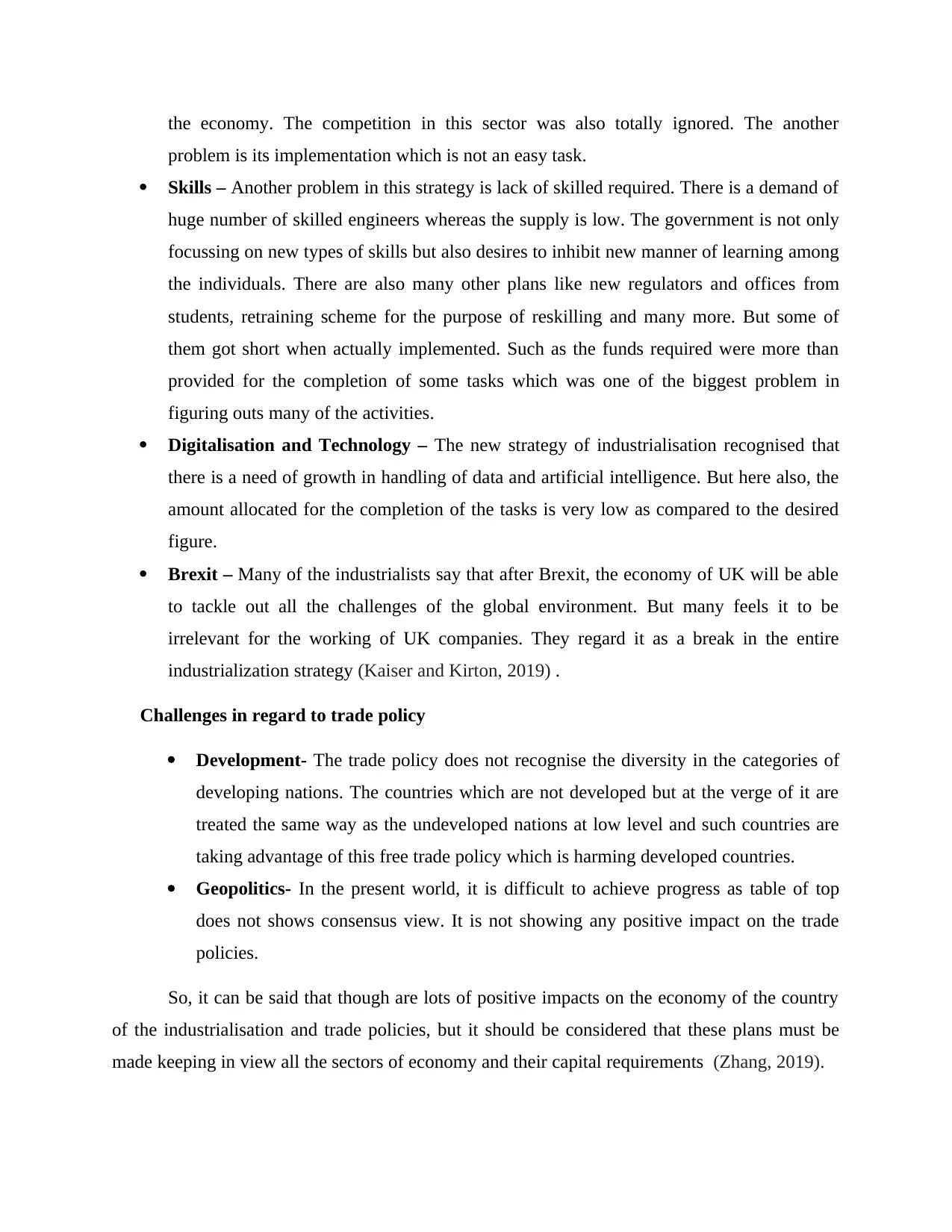
the economy. The competition in this sector was also totally ignored. The another
problem is its implementation which is not an easy task.
Skills – Another problem in this strategy is lack of skilled required. There is a demand of
huge number of skilled engineers whereas the supply is low. The government is not only
focussing on new types of skills but also desires to inhibit new manner of learning among
the individuals. There are also many other plans like new regulators and offices from
students, retraining scheme for the purpose of reskilling and many more. But some of
them got short when actually implemented. Such as the funds required were more than
provided for the completion of some tasks which was one of the biggest problem in
figuring outs many of the activities.
Digitalisation and Technology – The new strategy of industrialisation recognised that
there is a need of growth in handling of data and artificial intelligence. But here also, the
amount allocated for the completion of the tasks is very low as compared to the desired
figure.
Brexit – Many of the industrialists say that after Brexit, the economy of UK will be able
to tackle out all the challenges of the global environment. But many feels it to be
irrelevant for the working of UK companies. They regard it as a break in the entire
industrialization strategy (Kaiser and Kirton, 2019) .
Challenges in regard to trade policy
Development- The trade policy does not recognise the diversity in the categories of
developing nations. The countries which are not developed but at the verge of it are
treated the same way as the undeveloped nations at low level and such countries are
taking advantage of this free trade policy which is harming developed countries.
Geopolitics- In the present world, it is difficult to achieve progress as table of top
does not shows consensus view. It is not showing any positive impact on the trade
policies.
So, it can be said that though are lots of positive impacts on the economy of the country
of the industrialisation and trade policies, but it should be considered that these plans must be
made keeping in view all the sectors of economy and their capital requirements (Zhang, 2019).
problem is its implementation which is not an easy task.
Skills – Another problem in this strategy is lack of skilled required. There is a demand of
huge number of skilled engineers whereas the supply is low. The government is not only
focussing on new types of skills but also desires to inhibit new manner of learning among
the individuals. There are also many other plans like new regulators and offices from
students, retraining scheme for the purpose of reskilling and many more. But some of
them got short when actually implemented. Such as the funds required were more than
provided for the completion of some tasks which was one of the biggest problem in
figuring outs many of the activities.
Digitalisation and Technology – The new strategy of industrialisation recognised that
there is a need of growth in handling of data and artificial intelligence. But here also, the
amount allocated for the completion of the tasks is very low as compared to the desired
figure.
Brexit – Many of the industrialists say that after Brexit, the economy of UK will be able
to tackle out all the challenges of the global environment. But many feels it to be
irrelevant for the working of UK companies. They regard it as a break in the entire
industrialization strategy (Kaiser and Kirton, 2019) .
Challenges in regard to trade policy
Development- The trade policy does not recognise the diversity in the categories of
developing nations. The countries which are not developed but at the verge of it are
treated the same way as the undeveloped nations at low level and such countries are
taking advantage of this free trade policy which is harming developed countries.
Geopolitics- In the present world, it is difficult to achieve progress as table of top
does not shows consensus view. It is not showing any positive impact on the trade
policies.
So, it can be said that though are lots of positive impacts on the economy of the country
of the industrialisation and trade policies, but it should be considered that these plans must be
made keeping in view all the sectors of economy and their capital requirements (Zhang, 2019).
⊘ This is a preview!⊘
Do you want full access?
Subscribe today to unlock all pages.

Trusted by 1+ million students worldwide
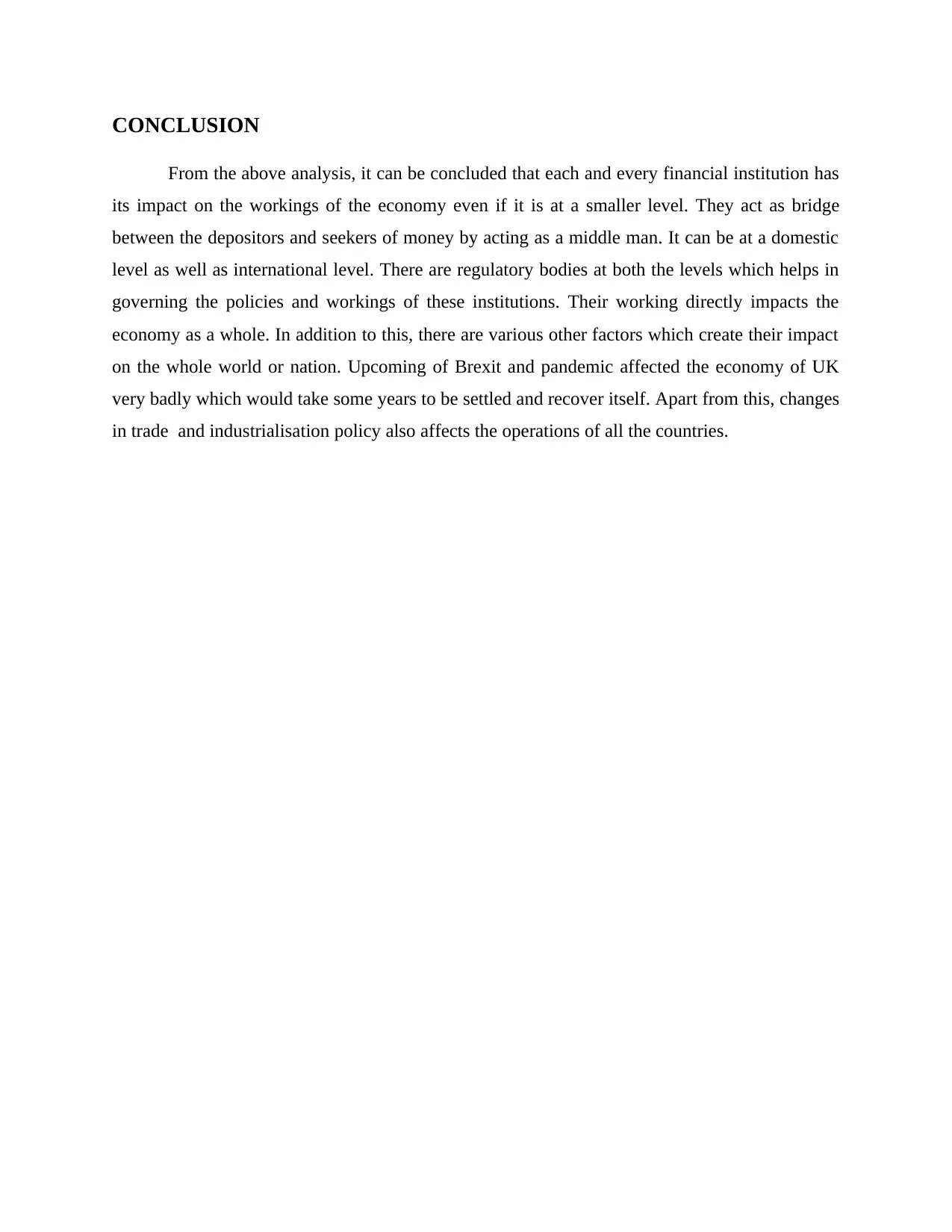
CONCLUSION
From the above analysis, it can be concluded that each and every financial institution has
its impact on the workings of the economy even if it is at a smaller level. They act as bridge
between the depositors and seekers of money by acting as a middle man. It can be at a domestic
level as well as international level. There are regulatory bodies at both the levels which helps in
governing the policies and workings of these institutions. Their working directly impacts the
economy as a whole. In addition to this, there are various other factors which create their impact
on the whole world or nation. Upcoming of Brexit and pandemic affected the economy of UK
very badly which would take some years to be settled and recover itself. Apart from this, changes
in trade and industrialisation policy also affects the operations of all the countries.
From the above analysis, it can be concluded that each and every financial institution has
its impact on the workings of the economy even if it is at a smaller level. They act as bridge
between the depositors and seekers of money by acting as a middle man. It can be at a domestic
level as well as international level. There are regulatory bodies at both the levels which helps in
governing the policies and workings of these institutions. Their working directly impacts the
economy as a whole. In addition to this, there are various other factors which create their impact
on the whole world or nation. Upcoming of Brexit and pandemic affected the economy of UK
very badly which would take some years to be settled and recover itself. Apart from this, changes
in trade and industrialisation policy also affects the operations of all the countries.
Paraphrase This Document
Need a fresh take? Get an instant paraphrase of this document with our AI Paraphraser
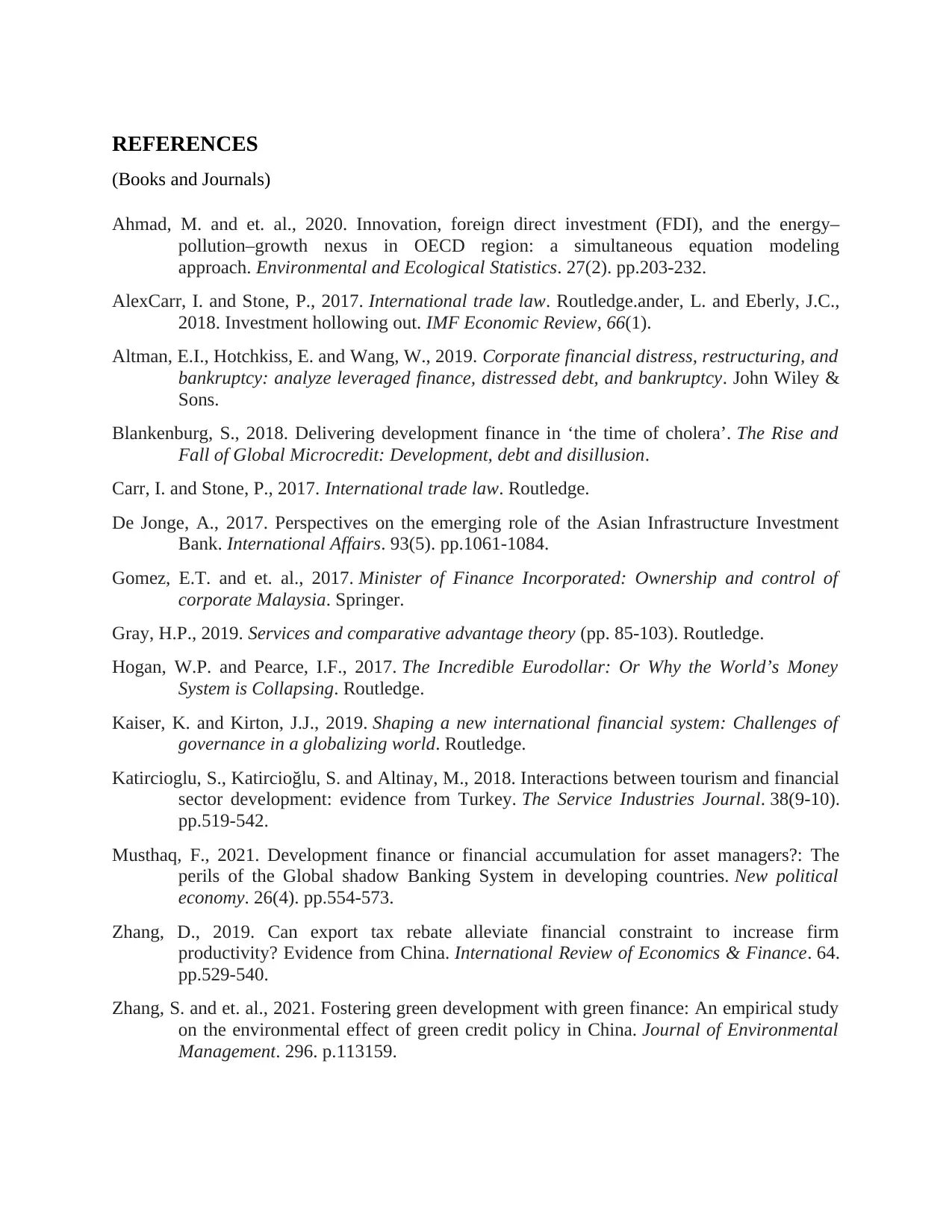
REFERENCES
(Books and Journals)
Ahmad, M. and et. al., 2020. Innovation, foreign direct investment (FDI), and the energy–
pollution–growth nexus in OECD region: a simultaneous equation modeling
approach. Environmental and Ecological Statistics. 27(2). pp.203-232.
AlexCarr, I. and Stone, P., 2017. International trade law. Routledge.ander, L. and Eberly, J.C.,
2018. Investment hollowing out. IMF Economic Review, 66(1).
Altman, E.I., Hotchkiss, E. and Wang, W., 2019. Corporate financial distress, restructuring, and
bankruptcy: analyze leveraged finance, distressed debt, and bankruptcy. John Wiley &
Sons.
Blankenburg, S., 2018. Delivering development finance in ‘the time of cholera’. The Rise and
Fall of Global Microcredit: Development, debt and disillusion.
Carr, I. and Stone, P., 2017. International trade law. Routledge.
De Jonge, A., 2017. Perspectives on the emerging role of the Asian Infrastructure Investment
Bank. International Affairs. 93(5). pp.1061-1084.
Gomez, E.T. and et. al., 2017. Minister of Finance Incorporated: Ownership and control of
corporate Malaysia. Springer.
Gray, H.P., 2019. Services and comparative advantage theory (pp. 85-103). Routledge.
Hogan, W.P. and Pearce, I.F., 2017. The Incredible Eurodollar: Or Why the World’s Money
System is Collapsing. Routledge.
Kaiser, K. and Kirton, J.J., 2019. Shaping a new international financial system: Challenges of
governance in a globalizing world. Routledge.
Katircioglu, S., Katircioğlu, S. and Altinay, M., 2018. Interactions between tourism and financial
sector development: evidence from Turkey. The Service Industries Journal. 38(9-10).
pp.519-542.
Musthaq, F., 2021. Development finance or financial accumulation for asset managers?: The
perils of the Global shadow Banking System in developing countries. New political
economy. 26(4). pp.554-573.
Zhang, D., 2019. Can export tax rebate alleviate financial constraint to increase firm
productivity? Evidence from China. International Review of Economics & Finance. 64.
pp.529-540.
Zhang, S. and et. al., 2021. Fostering green development with green finance: An empirical study
on the environmental effect of green credit policy in China. Journal of Environmental
Management. 296. p.113159.
(Books and Journals)
Ahmad, M. and et. al., 2020. Innovation, foreign direct investment (FDI), and the energy–
pollution–growth nexus in OECD region: a simultaneous equation modeling
approach. Environmental and Ecological Statistics. 27(2). pp.203-232.
AlexCarr, I. and Stone, P., 2017. International trade law. Routledge.ander, L. and Eberly, J.C.,
2018. Investment hollowing out. IMF Economic Review, 66(1).
Altman, E.I., Hotchkiss, E. and Wang, W., 2019. Corporate financial distress, restructuring, and
bankruptcy: analyze leveraged finance, distressed debt, and bankruptcy. John Wiley &
Sons.
Blankenburg, S., 2018. Delivering development finance in ‘the time of cholera’. The Rise and
Fall of Global Microcredit: Development, debt and disillusion.
Carr, I. and Stone, P., 2017. International trade law. Routledge.
De Jonge, A., 2017. Perspectives on the emerging role of the Asian Infrastructure Investment
Bank. International Affairs. 93(5). pp.1061-1084.
Gomez, E.T. and et. al., 2017. Minister of Finance Incorporated: Ownership and control of
corporate Malaysia. Springer.
Gray, H.P., 2019. Services and comparative advantage theory (pp. 85-103). Routledge.
Hogan, W.P. and Pearce, I.F., 2017. The Incredible Eurodollar: Or Why the World’s Money
System is Collapsing. Routledge.
Kaiser, K. and Kirton, J.J., 2019. Shaping a new international financial system: Challenges of
governance in a globalizing world. Routledge.
Katircioglu, S., Katircioğlu, S. and Altinay, M., 2018. Interactions between tourism and financial
sector development: evidence from Turkey. The Service Industries Journal. 38(9-10).
pp.519-542.
Musthaq, F., 2021. Development finance or financial accumulation for asset managers?: The
perils of the Global shadow Banking System in developing countries. New political
economy. 26(4). pp.554-573.
Zhang, D., 2019. Can export tax rebate alleviate financial constraint to increase firm
productivity? Evidence from China. International Review of Economics & Finance. 64.
pp.529-540.
Zhang, S. and et. al., 2021. Fostering green development with green finance: An empirical study
on the environmental effect of green credit policy in China. Journal of Environmental
Management. 296. p.113159.

⊘ This is a preview!⊘
Do you want full access?
Subscribe today to unlock all pages.

Trusted by 1+ million students worldwide
1 out of 12
Related Documents
Your All-in-One AI-Powered Toolkit for Academic Success.
+13062052269
info@desklib.com
Available 24*7 on WhatsApp / Email
![[object Object]](/_next/static/media/star-bottom.7253800d.svg)
Unlock your academic potential
Copyright © 2020–2026 A2Z Services. All Rights Reserved. Developed and managed by ZUCOL.

